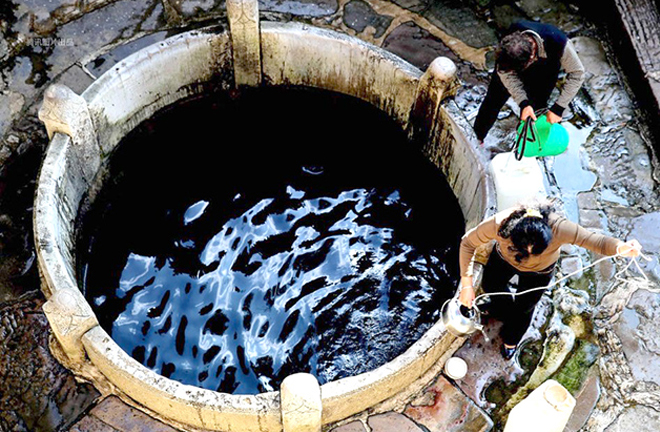Comparison of water technology deepens understanding of civilization

Daban Well, located in the Jianshui County, Yunnan Province, was built in the early Emperor Hongwu Years of the Ming Dynasty. It is still the first option for local people to cook, make tea and prepare tofu.
Water is the source of human civilization. Increasingly, academics have been cooperating on research projects involving water and how it relates to culture and history. In particular, there has been extensive progress in studies of water civilization and how it has affected the development of the East and the West.
Ancient China and Greece were two ancient civilizations in which harnessing water played a key role in their development. Zheng Xiaoyun, a research fellow from the Yunnan Academy of Social Sciences, said that civilization depends on nourishment from water and the support of water technologies. By comparing the technology of the two ancient civilizations, academics can better understand their foundations and similarities, and learn lessons on how to address contemporary water crises facing humankind, thus achieving sustainable development.
Andreas Angelakis, a research fellow from the Institute of Iraklion of the National Agricultural Research Foundation, visited China and other Asian countries in recent years. He said that ancient Chinese water technologies were advanced. The majority of them were indigenously designed and had a huge impact, and thus were an important part of the ancient civilization worldwide. However, foreign academics do not know enough about this and more academic exchanges would help.
Zheng and Angelakis conducted a comparative study and concluded that water technologies in ancient China and Greece had similarities. In ancient times, both countries produced a number of great thinkers, such as Confucius, Mencius, Xunzi and Laozi in China, and Thales, Plato, Aristotle, and Herodotus in Greece. They proposed a set of water ethics and principles for water governance. China and Greece are the cradles of urban water technology, which had far-reaching impacts throughout history.
The development of water technology and successful experience in water governance were essential to the creation, development and continuation of these two ancient civilizations, and gave evidence of the key role that water technology plays in the development of human civilization. Zheng said that the technologies used to build wells were a common development point for ancient cities in China and Greece. Wells were the most important facilities for using underground water. China and Greece were the two countries with the earliest technologies for developing wells, and the wide use of wells and development of related technologies advanced both civilizations.
Their collaborative research also reveals the differences in hydraulic techniques between ancient cities in China and Greece. For example, the development of urban water technology in ancient China benefited from river control, but ancient Greek cities were not so tied to rivers and relied on spring water and rainwater. Therefore, there is a direct relationship between the development of urban water technology in China and the utilization of rivers. Techniques such as barrages and sluices were more developed. Ancient Greek cities utilized springs and rainwater as well as some rivers, so water supply facilities such as diversion canals, water storage areas, drainage and distribution in the Greek cities were relatively advanced.
In recent years, China has held several international academic conferences on water civilization research. For example, the International Symposium on Water Wisdom and Achievement in Ancient Civilizations of China and Greece organized by the UNESCO International Hydrographic Program, Yunnan Minzu University and Aristotle University of Greece, held in 2015, enhanced the academic exchanges of Chinese and foreign experts.
The international academic community is ready to jointly launch the “Global Water Museum Network.” At present, the network has become a key part of UNESCO’s work agenda and it has been actively supported and promoted. Many water museums, such as the National Water Museum of China, also actively participated in the preparatory work of this project. This is a good start for China-foreign cooperation on water culture and education.
Zheng added that comparative research on water civilization between China and foreign countries not only provides us with historical experience in the sustainable use of water, laying a solid cultural foundation. It will also become a new way of understanding the history of human civilization, which will promote both academic research and economic development.
ZENG JIANG, ZHAO XUZHOU are correspondents with Chinese Social Sciences Today.
(edited by SUI JINGJING)
